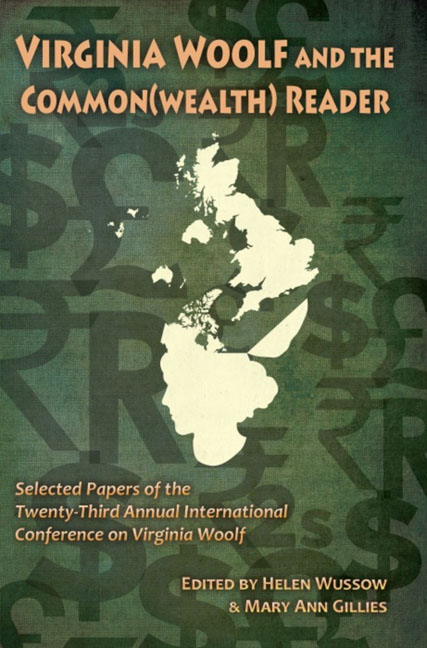Book contents
- Frontmatter
- Contents
- Introduction to Virginia Woolf and the Common(wealth) Reader
- Acknowledgments
- List of Abbreviations
- Invocations
- Networks of Affiliation: Foundations and Friends
- Woolf and the Commonwealth
- 1930s Onwards
- War, Peace, Internationalism: Bloomsbury Legacies
- “Caterpillars of the Commonwealth Unite”: Photography and Trauma in Three Guineas
- “Drawn from Our Island History”: Virginia Woolf, Nancy Mitford, and the Politics of Pageantry
- A ”Bloodless and Pernicious Pest”: The Middlebrow's “Common Man” in the Essays of Virginia Woolf
- Woolf's Troubled and Troubling Relationship to Race: The Long Reach of the White Arm of Imperialism
- Woolfian Seamarks: Commodified Women and the Racial Other on the Shores of Empire
- Documenting Fascism in Three Guineas and The Handmaid's Tale: An Examination of Woolf's Textual Notes and Scrapbooks and Atwood's “Historical Notes”
- Proportion, Conversion, Transition: War Trauma and Sites of Healing in Virginia Woolf's Mrs. Dalloway and Leslie Marmon Silko's Ceremony
- Woolf Beyond the Book
- Notes on Contributors
- Conference Program
Documenting Fascism in Three Guineas and The Handmaid's Tale: An Examination of Woolf's Textual Notes and Scrapbooks and Atwood's “Historical Notes”
from 1930s Onwards
- Frontmatter
- Contents
- Introduction to Virginia Woolf and the Common(wealth) Reader
- Acknowledgments
- List of Abbreviations
- Invocations
- Networks of Affiliation: Foundations and Friends
- Woolf and the Commonwealth
- 1930s Onwards
- War, Peace, Internationalism: Bloomsbury Legacies
- “Caterpillars of the Commonwealth Unite”: Photography and Trauma in Three Guineas
- “Drawn from Our Island History”: Virginia Woolf, Nancy Mitford, and the Politics of Pageantry
- A ”Bloodless and Pernicious Pest”: The Middlebrow's “Common Man” in the Essays of Virginia Woolf
- Woolf's Troubled and Troubling Relationship to Race: The Long Reach of the White Arm of Imperialism
- Woolfian Seamarks: Commodified Women and the Racial Other on the Shores of Empire
- Documenting Fascism in Three Guineas and The Handmaid's Tale: An Examination of Woolf's Textual Notes and Scrapbooks and Atwood's “Historical Notes”
- Proportion, Conversion, Transition: War Trauma and Sites of Healing in Virginia Woolf's Mrs. Dalloway and Leslie Marmon Silko's Ceremony
- Woolf Beyond the Book
- Notes on Contributors
- Conference Program
Summary
Virginia Woolf's 1938 essay, Three Guineas, and Margaret Atwood's 1985 dystopian speculative novel, The Handmaid's Tale, are visionary works that engage explicitly with the virulently sexist agenda of fascism and address the systemic oppression and exploitation of women under totalitarian rule. Both authors focus on the sex-based fascistic partitioning that divides the private from the public sphere and relegates women to the domestic sector; both investigate how female reproductive functions are exploited and used to prop up the specious patriarchal rationale for excluding women from positions of authority; both accentuate the specific sartorial conventions that demarcate women from men; both deliberately un-name key figures in the works; both emphasize the politics of a visual culture and both position their readers as witnesses to systemic crimes against women. In all these instances, the books function as inverse parallels or distorted mirror images of each other because each posits a different possible future.
In Three Guineas —written as fascism loomed large over a Europe on the verge of war—Woolf daringly envisions the possibility of women being liberated from patriarchy through civil disobedience and intellectual resistance. In The Handmaid's Tale, Atwood draws on actual historical events from the 1940s to the late 1980s to craft a disturbingly convincing futuristic version of what can happen to women as a secular Caucasian-dominated United States spins into religious fascism. In Three Guineas, Woolf urges “daughters of educated men” to speak their minds and print their words; in The Handmaid's Tale, Atwood crafts an imaginary society in which women are not only forced into servitude but are strictly silenced and deprived of all autonomy including access to literacy.
Woolf and Atwood both rely heavily on historical and journalistic materials that contextualize and validate what the reader witnesses in the texts. Maroula Joannou observes that Atwood, like Woolf, “kept a file of press cuttings while she was writing The Handmaid's Tale ” and quotes Atwood's statement to her interviewer Barbara Norden that she used contemporary journalistic sources “to prove that there was nothing in Gilead that wasn't happening or hadn't happened, somewhere in the world” (145).
- Type
- Chapter
- Information
- Virginia Woolf and the Common(wealth) Reader , pp. 183 - 189Publisher: Liverpool University PressPrint publication year: 2014



